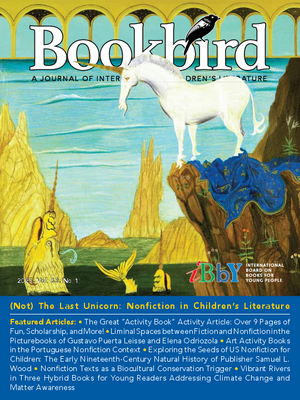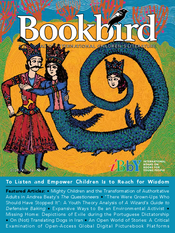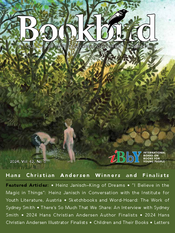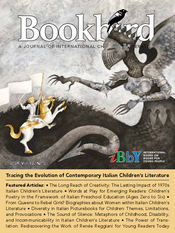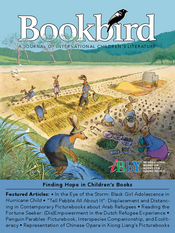Bookbird
A Journal of International Children's Literature
Bookbird: A Journal of International Children's Literature (ISSN 0006 7377) is a refereed journal published quarterly by IBBY. Bookbird aims to communicate new ideas to the community of readers interested in children's books and is open to any topic in the field of international children's literature. Bookbird also includes themed issues for which the editor will post calls for manuscripts on the IBBY website. Bookbird also includes news of IBBY projects and events which are highlighted in the Focus IBBY column. Other regular features include coverage of children's literature studies and children's literature awards around the world as well as reading promotion projects worldwide.
Bookbird is indexed by Scopus and is available in print and online through Project Muse. For more information see below and the Bookbird Facebook page.
Bookbird en Español
Bookbird, Inc. se complace en anunciar que Bookbird, la revista de literatura infantil internacional de IBBY está disponible en versión digital en español. Bookbird en español reproduce el contenido íntegro y el formato idéntico al de la edición en inglés, y se edita trimestralmente, poco después de la publicación del número en su versión original.
Bookbird en español es una publicación de Jacarandá Editoras (Argentina). Para más información sobre la revista y cómo suscribirse, visite bookbird-esp.com.ar.
¡Disfrute de la maravillosa revista de IBBY desde ya, en su idioma!
Bookbird, Inc. is delighted to announce that IBBY’s journal Bookbird: A Journal of International Children’s Literature is now available in Spanish in an online edition. The contents and layout will be exactly the same as in the English language edition, and each issue will appear soon after each English language issue is published.
Bookbird en Español is produced by Jacarandá Editoras in Argentina. Details about subscribing may be found at bookbird-esp.com.ar.
Now Spanish speakers can read IBBY’s wonderful journal in Spanish!

Latest Bookbird issue
Bookbird Issue 1 / 2025 (63.1)
(Not) The Last Unicorn: Nonfiction in Children’s Literature
Dowload Focus IBBY
Subscribe to Bookbird
Download articles on Project Muse
Call for Papers - "Crime in Children’s Literature"
Bookbird: A Journal of International Children’s Literature is seeking contributions for a special issue on crime in children’s literature
Call open until 15 August 2025
From child detectives in the mystery tradition (McGee 2024) to child thieves (Gubar 2009), from incarceration narratives (Caponegro 2021) to sexual abuse (Plieth 2022), crime has been a constant presence within children’s literature and children’s literature scholarship for many years. Despite numerous valuable research on justice in children’s literature (see Oziewicz 2015) and discussion around a multitude of crime-related concepts, the very genre of children’s crime fiction remains somewhat undefined, blurry at the edges.
There is barely a dedicated study on it and children’s crime fiction is often discussed in relation to mystery or adventure stories. This special edition aims to create a starting point to address this gap in the research and put the spotlight on crime in children’s literature.
Despite crime being a heavy topic in general—with many societal issues connected to it, it is also rendered as a ludic place of escape within the context of children’s literature; such as the rendition of a game of cops and robbers or a mystery to solve and cater to children’s curious nature. As argued by Veldhuizen (2023), “The child detective approaches the crime like a serious game, with set rules, roles, and expectations. The act of detection is framed as exciting, occasionally dangerous but generally fun”. The genre can invite the reader in to engage playfully with mysteries and (in)justice, just as much as it can foreground (literally) dead serious issues of right and wrong. It is this push-and-pull between children’s literature and crime fiction traditions that make the genre of children’s crime fiction so fascinating.
We are looking for submissions which may address the following or related matters:
- The child in relation to crime; as criminal, witness and/or crime fighter
- Pedagogical reflections on crime and criminality in children’s literature; is crime inherent in society, (sometimes) excusable, morally ambiguous? Does justice exist, and if so, what form does it take?
- Criminal taboos in children’s literature
- Children’s crime fiction as a ludic genre
- Criminality and identity in children’s literature; are certain groups presented as more or less criminal in nature? How is the child positioned in relation to crime?
- How is the line between non-criminal and criminal behaviour established in children’s literature?
- Spaces and places of criminality in children’s literature
- Children’s literature and reading itself as criminal activities
- Crime as an adventure; does children’s crime literature “run the risk” of “reducing” crime to (innocent) ludic fun?
Full papers should be submitted to the editor, Chrysogonus Siddha Malilang (chrysogonus.siddha.malilang@mau.se) and guest editor Vera Veldhuizen (v.n.veldhuizen@rug.nl) by 15 August 2025.We also welcome submissions for “Letters” and “Children and Their Books” with the same topics. Please see Bookbird’s website at www.ibby.org/bookbird for full submission details.


